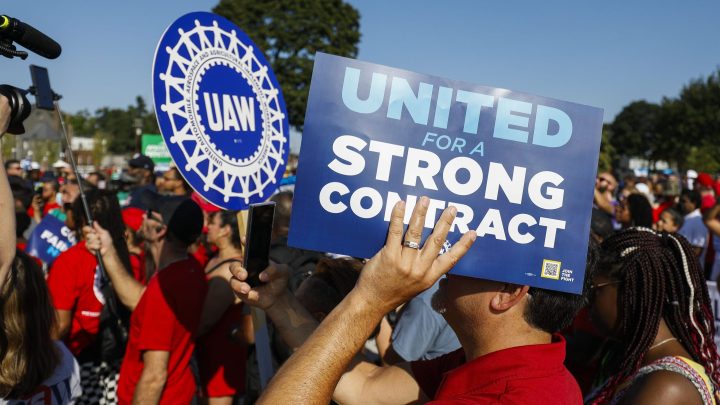
United Auto Workers strike would hit the Upper Midwest hard
United Auto Workers strike would hit the Upper Midwest hard

Time is running short for the union representing autoworkers and the Big Three automakers to reach a deal. Contracts with Ford, GM and Stellantis all end at the end of Thursday, and the president of the United Auto Workers union has made clear that members are prepared to strike.
Car companies will take an economic hit if about 150,000 of their unionized workers walk off the job. But a strike could have broader ripple effects too — especially in the Upper Midwest, in states like Michigan, Indiana, Illinois and Ohio, where much of the Big Three’s United States manufacturing is based.
By one estimate, if a strike at all Big Three automakers lasted just ten days, economic losses would top $5 billion across the country and send some Upper Midwest states reeling.
“So, there are a few types of losses,” said Cristina Benton with Michigan-based Anderson Economic Group, which calculated that estimate.
“First, lost wages to workers, and that includes the striking workers and others who are temporarily laid off or forced to decrease work hours,” Benton explained.
Then, there’s the losses that the carmakers would see if they’re not delivering new vehicles. And finally, there’s the impact on suppliers of parts for the cars the Big Three assemble. Those companies are all over the Upper Midwest, said Erik Gordon at the University of Michigan.
“If a big three automaker isn’t manufacturing cars, then the people who manufacture the seats, the braking systems, the sound systems that go in the cars, they will close down,” Gordon said.
If a strike drags on long enough, restaurants and retailers that rely on traffic from autoworkers could take a hit too. But, Gordon thinks other industries could benefit.
“The casinos will do well, because there’ll be people who have lots of time on their hands,” he said. “People will go fishing, we like to do that in the Midwest.”
A drawn-out strike could eventually hit car dealers too, in the Midwest and everywhere else. But, maybe not right away, said Bill Adams, chief economist at Comerica Bank.
“The carmakers have seen this coming. And they’ve been building up inventories in anticipation of the potential of a strike in the second half of this year,” he said.
And there’s one more threat to the Upper Midwest’s auto industry, Adams said: A strike would come as the region is already losing ground in the transition to electric vehicles.
“And that’s been a challenge for the Upper Midwest, since a lot of those plants and especially the battery manufacturing plants have been breaking ground in the Sunbelt,” Adams said.
That’s a competition that will continue to play out no matter how long a strike lasts.
There’s a lot happening in the world. Through it all, Marketplace is here for you.
You rely on Marketplace to break down the world’s events and tell you how it affects you in a fact-based, approachable way. We rely on your financial support to keep making that possible.
Your donation today powers the independent journalism that you rely on. For just $5/month, you can help sustain Marketplace so we can keep reporting on the things that matter to you.











